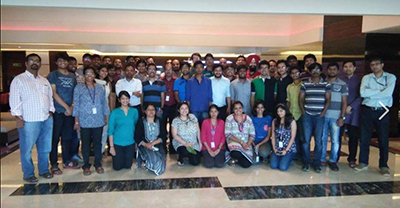 The 2016 IBM Global Interns working in Bangalore, India.
The 2016 IBM Global Interns working in Bangalore, India.
Anshumaan Bajpai is working toward completing his Ph.D in chemical engineering at the University of Notre Dame this summer. But just last May, his talents landed him in Bangalore, India working on a project for a fashion designer, the results of which were on display during Fashion Week in Melbourne, Australia.
Bajpai was one of just under a dozen students chosen for the 2016 Global Internship Program, a unique internship program offered through IBM. The University of Notre Dame is one of four academic institutions invited to participate in the program, which gives students the opportunity to work on real world projects alongside mentors at one of IBM’s Global Research Centers in Beijing, Zurich, Bangalore, and Dublin.
“For any student to get an industry internship like this is a fantastic opportunity,” said David Balkin, managing director of NDnano, the Center for Nano Science and Technology at Notre Dame. “Industry research is goal oriented, it’s competitive, and it gives students this great experience that provides them insight into how a Ph.D. in industry is tasked to do more than one thing.”
Bajpai’s experience is a perfect example. A chemical engineer who has interests in imaging analysis and data science had been accepted and assigned to a project at IBM’s Global Research Center in Bangalore in May of 2016. Shortly after he began working on his designated project. However, a call came in with a change of plans in early June.
Fashion designer Jason Grech wanted IBM to help him develop a tool that could predict trends before getting to the runway. They would need to build a program analyzing a decade’s worth of fashion trends including seasonal colors and styles, and commentary from social networks. Additionally, the final solution had to be able to integrate Grech’s personal interest in architecture, which was an inspiration for his designs.
“It was challenging because we were under a very tight deadline,” Bajpai said. Working with mentor Vikas Raykar at IBM Research, he had little more than a month to deliver a final product to Grech. Melbourne’s Fashion Week would begin at the end of August of that year.
The result was a success, with Grech calling it his “best collection to date” in videos featuring his collaboration with IBM Watson.
Off the runway, the experience was one that will not be soon forgotten by Bajpai.
“When the project changed and we began working on this tool for [Grech], I recognized the critical schedule constraints and the importance of communicating and delivering project updates in real time,” Bajpai said.
His IBM internship experience highlighted the importance of multidisciplinary research and teamwork – a benefit Balkin is quick to emphasize.
“It enabled him to demonstrate the breadth of expertise he cultivated as a Notre Dame student,” Balkin said. “It’s exciting for students to realize that their Ph.D. studies provide them with the ability to think critically and contribute immediately to multidisciplinary projects unrelated to their dissertation topics.”
Since it launched in 2010, dozens of students have participated in the program. This year’s interns will tackle projects that address challenges of developing a smarter planet, the cloud and cognitive computing.
Bajpai said the experience is one that he loves to talk about. Not only was he able to see his work directly impact the fashion industry and society, but it opened his eyes to the value of mentors and the benefits of interacting with industry researchers.
Balkin hopes that more students like Bajpai will take advantage of this exciting program that benefits all involved.
“The work these students are doing definitely has an impact, which is exciting,” he said. “It’s giving them a new perspective on what research can be.”
The IBM Global Internship Program is available to both undergraduate and graduate students. For more information, contact David Balkin, 574-631-6470, dbalkin@nd.edu.
About NDnano
Researchers at Notre Dame’s Center for Nano Science and Technology (NDnano) are collaborating across traditional scientific boundaries to develop more energy-efficient, cost-effective, and environmentally friendly technologies to address global challenges. With expertise in a breadth of materials, processes, and characterization tools and techniques, NDnano researchers are leveraging the University’s world-class facilities in order to develop solutions that will help address the world’s problems, such as the need for clean water, climate change solutions, clean energy, and post-silicon computer technology to stay apace of Big Data demands. Learn more at nano.nd.edu.
Originally published by at nano.nd.edu on May 05, 2017.